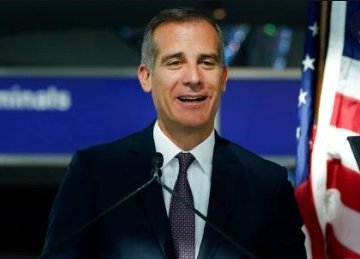New Delhi: US Ambassador Eric Garcetti Wednesday said India and the US can work jointly in resisting “coercion” and deploy ships and air forces together in the Indo-Pacific to ensure freedom of the skies and the seas. The US Ambassador explained how the two largest democracies have the power to build a more peaceful world.
In an address at an event in IIT-Delhi, the envoy said the two countries are poised to further deepen co-production of military equipment and cited the planned work in aero-engines, artillery and ground vehicles as just a few examples.
Touching on the issues relating to human rights, Garcetti said the US will continue to engage with India on it “as we have always done, and as we do in all countries around the world.”
He also quoted Mahatma Gandhi: “Our ability to reach unity in diversity will be the beauty and test of our civilization.”
The US ambassador said India and the US together can build a bulwark against the “might makes right” mentality, in comments seen as an oblique reference to China.
He said Prime Minister Narendra Modi’s state visit to Washington last week “crystallised” that the India-US partnership is accelerating at “breathtaking speed” and is having “undeniable impact”.
“The US and India have the power to set an example and build a more peaceful world, in the Indo-Pacific region and beyond. A key component of peace is protection,” he said.
“As we’ve unfortunately seen over the past three years, we live in a world in which countries ignore sovereign borders, advancing their claims through violence and destruction,” he said, in an apparent reference to China and Russia.
“This is not the world we want. This is not the world we need,” he added.
The envoy emphasised that both sides should set higher ambition in the relationship and focus on realising it. He underscored his remarks with a simple Hindi phrase: “Sapne sakar karna (making dreams into reality)”.
“We can stand together for choice, resisting coercion. We can stand together as a force for stability to avert regional and global crises. We can deploy our ships together in the Pacific and Indian oceans, and even beyond, to ensure maritime security,” he said.
“We can employ our air forces across the Indo-Pacific region to ensure freedom of the skies and the seas, and to jointly respond to humanitarian crises from the Sahara to the Pacific Islands,” he added.
“We can coordinate our land-force exercises across regions to bolster the sovereign defense of all countries who want to work with us. These are opportunities fully within our control as ‘Major Defence Partners’,” he noted.
Garcetti described Modi’s visit to the US as the celebration of the India-US ties.
“The celebration was real. And from the White House to the Capitol, the American government, across party lines, congressional houses, and the different branches of government all brought a fantastic celebration,” he said.
“From the welcome-filled with pomp and American tradition, to the Indian-inspired menus that incorporated millet touches — from the thoughtful gifts to PM Modi’s stirring speech before Congress,” he added.
“From the groundswell of pride among Indian-Americans who saw that their place in the US-India story was so appreciated, to the graciousness of the Prime Minister and the Indian delegation — It was all so very memorable,” he noted.
Garcetti said the US and India are better off, and they will produce better results, when they work together for peace, prosperity and for the planet.
“When Prime Minister Modi said that ‘today’s era is not an era of war’ it caught the ears of the entire world. What a powerful idea. What a necessary idea. And President Biden has spoken about this moment being ‘an inflection point’,” he said.
“Of course, lasting peace isn’t something that just happens; it has to be carefully built and nurtured,” he said.
Touching upon the issues relating to human rights, Garcetti said, “We will continue to engage on human rights issues, as we have always done, and as we do in all countries around the world.”
“As Vice President (Kamala) Harris said last week, reflecting on the lessons her grandfather, who helped fight for India’s independence taught her, we must not only have democracy, but work to defend democracy,” he said.
Garcetti said the idea of India and the US “dreaming and succeeding” together are an “unbeatable combination”.
“I hope soon we’ll see the United States and India working together across the Pacific and into the Atlantic, from Central Asia to Southern Africa,” he said.
On defence production, he said: “When the US and India work together to co-produce military equipment, we create a state-of-the-art system at a sustainable cost and with resilient supply chains for India, the US, and our partners.”
He said the announcements made during Modi’s visit set a marker and highlighted incredible potential in the sector.
“Through the co-production work that is already happening in airframes and engineering, and the planned work in aero engines, artillery, and ground vehicles, to name just a few, we are poised to further deepen co-production and tackle new opportunities — some that we can’t even imagine today,” he said.
The ambassador also emphasised on having “trust” between the militaries of the two countries.
“Like any other skill, it takes practice and trust. We need to institutionalise trust by increasing our human interaction, communication, and interoperability between our forces,” he said.
“And as we master interoperability on the land, sea, and air, we can advance our partnership in new frontiers, including outer space and cyberspace,” he added.
PTI
